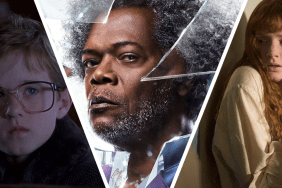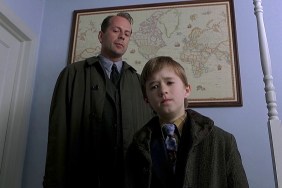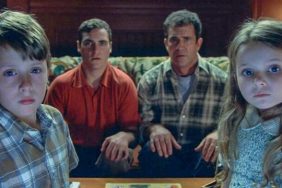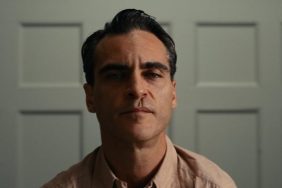Twenty years on from its release, M. Night Shyamalan‘s The Village paints a haunting and tragic picture of fear and ignorance that is broken through by love.
It features a fantastic cast that includes Bryce Dallas Howard, Joaquin Phoenix, Adrien Brody, William Hurt, Brendan Gleeson, Judy Greer, Jesse Eisenberg, and Sigourney Weaver. The story sees a man spark a chain of devastating events when he dares to venture beyond the confines of his secluded Pennsylvania village. The aftermath will lead to shocking revelations for the community and a tragedy that caused their isolation unearthed.
The problem with M. Night Shyamalan’s early films, and indeed still today, is that there’s an expectation. There will be a twist, and how good the film is will likely be judged by how smug or frustrated people feel about figuring it out. In those earlier films, that reaction was at its most volatile. Rather than look at everything else his films did well, the accusation was consistently put forward that Shyamalan was a twist fiend. That he simply couldn’t do without them.
The man himself did little to dispel that with films immediately following The Sixth Sense. However, there seemed to be a misunderstanding about what constitutes a twist. 2004’s The Village felt like the first of his films to be unfairly tarred with that twist fiend brush.
And I sit here knowing I was as guilty of it as anyone else. I vividly remember standing in line for another film at the cinema when The Village had just come out, and the slow-moving outgoing procession from a recent screening just so happened to have one person loudly chatting about the film’s big revelation in detail. Naturally, that annoyed a bunch of people, myself included. After that, I didn’t bother seeing The Village in theaters and felt entirely unenthusiastic about it.
The Village of the Damned

But a film is not dependent on its revelations alone. The Village is so much more than that moment and how you feel about it. There’s a surprisingly sincere love story between the blind Ivy (Dallas Howard) and the quiet Lucius (Phoenix). It’s key to that revelation ever coming to light and is the true driving force.
The film hides its sleight of hand in the fallout from the revelations. The reasoning for the village’s secretive seclusion is far less sinister than you’ve been led to believe. It’s a part of the movie that has become more relevant with time. People build a deluded version of reality to hide away from the things that hurt them instead of dealing with that pain. They don’t see the damage their supposed safety causes until it’s too late, and it’s not out of hatred. They try to prevent outside interference but fear.
And so the sincerity of the love story comes into play. It drives a quiet rebellion. A slightly saccharine, hopeful message that love can soothe pain and help us push through it.
Throw in the fact it’s still Shyamalan’s most beautiful audiovisual experience (with Roger Deakins’ cinematography and James Newton Howard’s score a big help), and you have a film that deserves to be placed at the top table of Shyamalan’s filmography.










